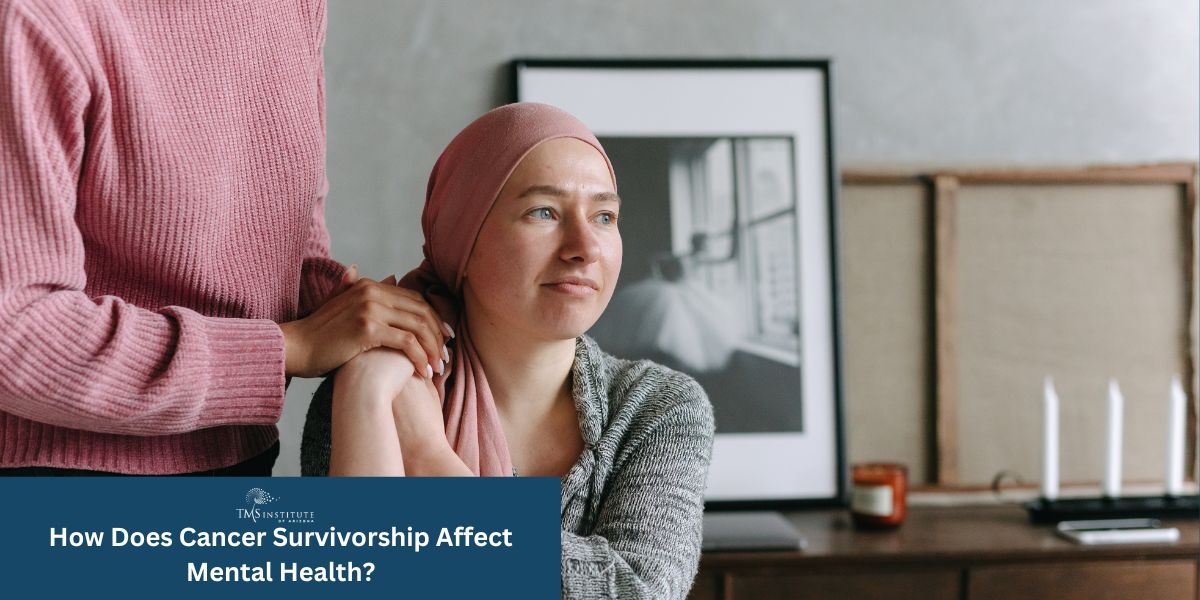
Surviving cancer is a major victory. But, it often marks the start of a new battle. The emotional impact doesn’t end with treatment and can manifest as anxiety, depression, or isolation. Nearly 40% of survivors face psychological challenges. For many, mental wellness becomes another uphill climb.
What Does the Study Reveal About Mental Health Risks in Cancer Survivors?
Research reveals a striking connection between cancer survivorship and mental health struggles. Cancer survivors face significantly higher risks of depression, anxiety, non-fatal self-harm, and suicide compared to those without cancer. Research emphasizes the urgent need for targeted psychological support. Managing these challenges is important to enhancing survivors’ mental health outcomes.
The Scope and Methodology of the Study
Researchers analyzed data from the UK Clinical Practice Research Datalink, including 853,177 cancer survivors diagnosed between 1998 and 2018. Over 8 million cancer-free individuals served as comparators. Matched by age, sex, and general practice.
The study focused on the 20 most common cancers, employing advanced Cox regression models to adjust for shared risk factors. This large-scale, detailed method allowed the researchers to draw meaningful understandings of the association between cancer survivorship and mental health outcomes.
Key Findings: A Comprehensive Overview
Cancer survivors were found to have much higher risks of mental health challenges, starting soon after diagnosis. Long-term effects persist, stressing the ongoing psychological effect of cancer survivorship.
- Depression and Anxiety:
- Survivors of all 20 cancers studied experienced a higher incidence of depression and anxiety compared to cancer-free individuals.
- Risks peaked in the first year after diagnosis and stayed high over time. Many cancer types showed elevated mental health risks even five years later.
- Non-Fatal Self-Harm (NFSH):
- Increased rates of NFSH were observed in survivors of 17 out of the 20 cancers studied.
- Younger survivors showed a particularly high vulnerability to self-harm behaviors.
- Suicide:
- Completed suicide rates were particularly elevated in 8 of the 20 cancer types.
- The highest suicide risks were noted in cancers with poorer prognoses. Such as lung and esophageal cancer, particularly during the first year post-diagnosis.
Mental Health Outcomes Vary by Cancer Type and Prognosis
Cancers with low five-year survival rates showed higher mental health risks. Survivors faced greater challenges with anxiety and depression. For instance:
- Cancers with Lower Survival Rates:
- Lung and esophageal cancer survivors showed hazard ratios (HRs) above 2.5 for both anxiety and depression.
- Survivors also demonstrated the highest risks for NFSH and suicide.
- Cancers with Higher Survival Rates:
- Survivors of malignant melanoma had lower but still elevated risks. HRs ranging between 1.1 and 1.2 for anxiety and depression.
Persistence of Risks: A Long-Term Burden
One of the study’s most significant revelations was the persistence of mental health risks among long-term cancer survivors:
- Five years post-diagnosis, survivors of 18 out of 20 cancers studied still faced elevated risks of depression.
- Anxiety remained a concern for survivors of 14 cancers even after five years.
Factors Contributing to Increased Mental Health Risks
The study pinpointed several factors that contribute to the heightened risks of mental health challenges in cancer survivors:
- Physical Impact of Cancer and Treatment:
- Chronic pain, fatigue, and other long-term side effects can influence emotional well-being.
- Fear of Recurrence:
- Fear of cancer returning often persists after remission. Survivors frequently face lingering anxiety.
- Socioeconomic Stress:
- Financial strain from treatment costs and employment challenges worsens psychological distress.
- Reduced Healthcare Interaction Over Time:
- Healthcare interactions often decrease after active cancer treatment. Many survivors feel abandoned or neglected during this phase.
Study Strengths and Limitations
A large sample size and reliable data made the study highly credible. Researchers focused on cancer types individually instead of grouping them together. This method revealed more precise and detailed results.
However, the researchers also noted limitations:
- Data on socioeconomic factors like employment and marital status were incomplete.
- Researchers had limited data on private or self-referred psychological treatments. Mental health intervention rates may be underestimated as a result.
- Frequent healthcare visits by cancer survivors may have led to detection bias. Increased interactions likely raised the chances of diagnosing mental health conditions.
Despite limits, the study offers a strong understanding into cancer survivors’ mental health challenges.
Implications for Support and Intervention
Suggested interventions include:
- Routine Mental Health Screening:
- Regular assessments for depression, anxiety, and suicidal ideation. Mainly in survivors of high-risk cancers.
- Integrated Care Models:
- Collaboration between oncologists, mental health professionals, and primary care providers to deliver comprehensive support.
- Tailored Psychological Interventions:
- Addressing the unique mental health needs of survivors based on cancer type, prognosis, and individual circumstances.
How Does Anxiety and Depression Manifest Differently in Cancer Survivors?
Anxiety and depression take on distinct forms in cancer survivors compared to the general population. These conditions often intertwine with physical symptoms and cancer-specific fears, making them more difficult to diagnose and manage.
Anxiety in Cancer Survivors
- Hypervigilance: Survivors often become acutely aware of physical sensations, fearing they signal cancer recurrence. This heightened body awareness, while understandable, can lead to chronic anxiety.
- Intrusive Thoughts: Persistent, uncontrollable worries about cancer returning or progressing dominate the survivor’s mental space, interfering with daily life.
- Avoidance Behaviors: Many survivors avoid follow-up appointments or health-related discussions due to fear of bad news. While this may offer temporary relief, it often exacerbates anxiety in the long term.
Depression in Cancer Survivors
- Loss of Purpose: Survivors frequently report a diminished sense of purpose after completing treatment, particularly if their lives revolved around battling the disease. This can lead to feelings of emptiness and hopelessness.
- Physical Limitations: Chronic fatigue, pain, or disability resulting from treatment can restrict activities that once brought joy, fueling depressive symptoms.
- Guilt and Shame: Survivor’s guilt often manifests as self-critical thoughts or feelings of worthlessness. For some, these emotions escalate into severe depression.
Overlapping Symptoms: The Mind-Body Connection
In cancer survivors, anxiety and depression often overlap with physical symptoms, complicating diagnosis and treatment:
- Fatigue and Sleep Disturbances: Both anxiety and depression contribute to poor sleep quality, creating a cycle of exhaustion and emotional distress.
- Cognitive Impairments: Depression can amplify memory and concentration issues already affected by treatment-related cognitive decline.
- Appetite Changes: Survivors may experience weight fluctuations, with loss of appetite linked to depression and overeating driven by anxiety.
How Can Healthcare Providers Address These Mental Health Challenges?
Healthcare providers are important in lessening mental health challenges for cancer survivors. Managing emotional hurdles requires a compassionate and thorough strategy. Support must extend well beyond the treatment phase to be effective.
Providers can make a meaningful difference by:
1. Routine Mental Health Screening
- Early Detection: Integrating mental health assessments into survivorship care identifies anxiety and depression early. Early screening is suggested to catch signs of psychological distress. Mental health risks are highest within the first year after diagnosis.
- Standardized Tools: Validated tools like PHQ-9 for depression and GAD-7 for anxiety provide accurate assessments. They help deliver reliable and actionable mental health insights.
- Long-Term Monitoring: Regular follow-ups manage remaining vulnerabilities in cancer survivors. Such check-ins also reduce the risk of overlooking mental health concerns.
2. Integrated Care Models
- Oncology and Mental Health Collaboration: Cross-disciplinary teams that include oncologists, psychiatrists, psychologists, and social workers provide holistic care for survivors. Integrated care improves both mental health outcomes and quality of life.
- Tailored Interventions: Care plans based on cancer type, prognosis, and individual needs are more effective. For instance, lung cancer survivors with higher risks may require more intensive mental health support than survivors of skin cancer.
3. Practical Resources and Education
- Empowering Survivors: Providing education about common mental health challenges in survivorship reduces stigma and encourages help-seeking behavior.
- Navigation Assistance: Survivors often need help guiding insurance, financial aid, and community resources. Delivering access to patients can ease practical stressors that contribute to mental health issues.
Why Should You Consult the TMS Institute of Arizona for Comprehensive Mental Health Support?
Your mental health deserves expert care. The TMS Institute of Arizona specializes in advanced, non-invasive treatments like Transcranial Magnetic Stimulation (TMS) for depression, anxiety, and PTSD.
TMS is a safe and FDA-approved therapy for conditions like depression, anxiety, and PTSD. Magnetic pulses target specific brain areas to improve mood regulation. The treatment is non-invasive and works without relying on medication.
Our team focuses on delivering effective care that addresses your unique needs. Let us help you find relief and reclaim joy. Contact us today. You deserve to feel your best!
References
Park, J.-H., Chun, M., Jung, Y.-S., & Bae, S. H. (2017). Predictors of Psychological Distress Trajectories in the First Year After a Breast Cancer Diagnosis. Asian Nursing Research, 11(4), 268–275. https://doi.org/10.1016/j.anr.2017.10.003
Forbes, H., Carreira, H., Funston, G., Andresen, K., Bhatia, U., Strongman, H., Esha Abrol, Bowen, L., Giles, C., & Bhaskaran, K. (2024). Early, medium and long-term mental health in cancer survivors compared with cancer-free comparators: matched cohort study using linked UK electronic health records. EClinicalMedicine, 76, 102826–102826. https://doi.org/10.1016/j.eclinm.2024.102826
I. Vaz-Luis, Masiero, M., G. Cavaletti, Cervantes, A., Chlebowski, R. T., G. Curigliano, E. Felip, Ferreira, A. R., Ganz, P. A., Hegarty, J., Jeon, J., Johansen, C., Joly, F., Jordan, K., Koczwara, B., Lagergren, P., M. Lambertini, Lenihan, D., H. Linardou, & Loprinzi, C. (2022). ESMO Expert Consensus Statements on Cancer Survivorship: promoting high-quality survivorship care and research in Europe. Annals of Oncology, 33(11), 1119–1133. https://doi.org/10.1016/j.annonc.2022.07.1941
Note: This article is for informational purposes only and is not a substitute for professional medical advice. Always consult a doctor.













